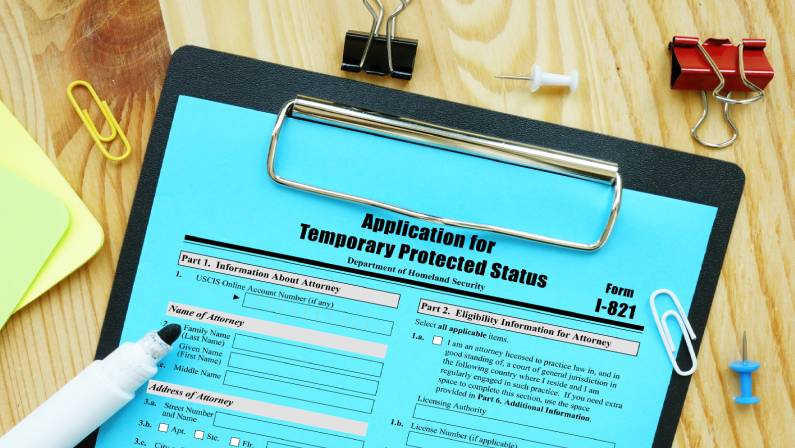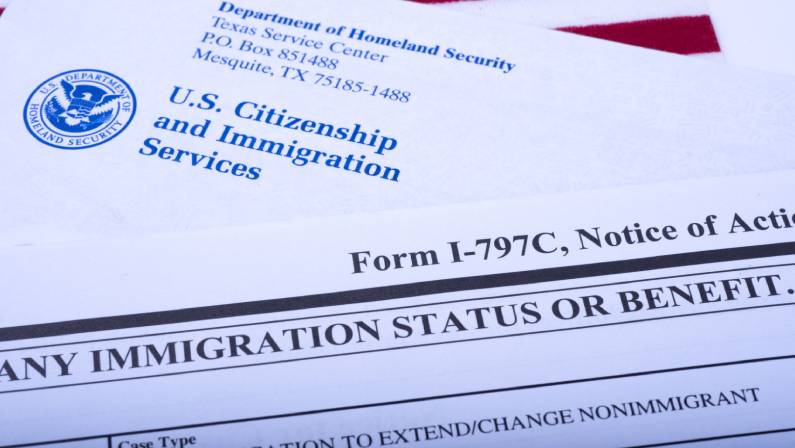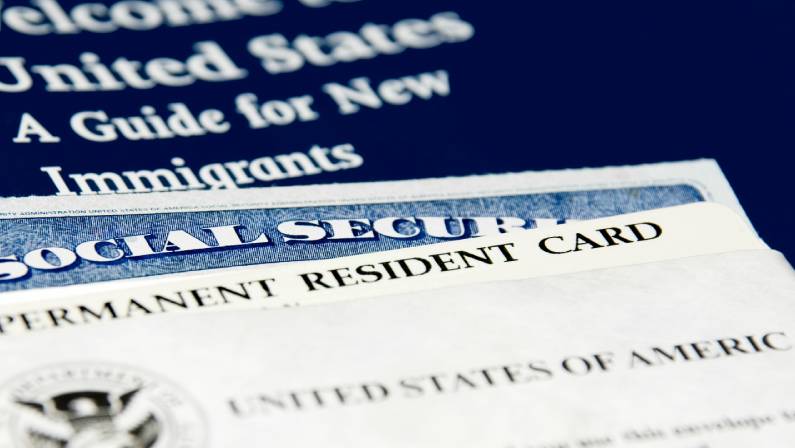If you have been living in the United States with Temporary Protected Status (TPS), you may wonder if there is a way to adjust your status and become a permanent resident. Unfortunately, TPS does not automatically lead to a green card, but there are several ways to obtain one. This guide will walk you through the process of adjusting your status from TPS to a green card. We will also answer some common questions about TPS and green cards.
What is Temporary Protected Status (TPS)?

Temporary Protected Status (TPS) is a special designation given to foreign nationals who are unable to return to their home country due to a natural disaster, civil war, or other emergency situation. TPS allows these individuals to live and work in the United States for a temporary period of time. TPS holders are not eligible for permanent residency or citizenship, but they can apply for a green card through another route.
For what reasons can a country be designated for TPS?
TPS designation for a nation may occur for any of the following factors:
An ongoing armed conflict
An ongoing armed conflict can make a country eligible for TPS because it leaves the citizens of that country unable to return safely. A civil war or other emergency situation can also be grounds for TPS status.
An environmental disaster
Natural disasters, such as hurricanes or earthquakes, can devastate a country and leave its citizens unable to return safely. A country can be designated for TPS if it is unable to handle the return of its citizens due to an environmental disaster.
Extraordinary but temporary conditions
Temporary alarming events in the foreign country that make it unsafe for its citizens to return there can be eligible for TPS (unless the U.S. government finds that permitting these nationals to remain temporarily in the United States is contrary to the U.S. national interest).
You should contact an immigration lawyer or law firm for assistance with TPS designation.
What are the benefits of being a TPS beneficiary?
Holding a TPS grant includes benefits, such as:
- TPS holders are able to live and work in the United States for a temporary period of time.
- TPS holders may be eligible for permanent residency or citizenship through another route.
- TPS designation can provide some protection from deportation.
Who has the authority to designate a country for TPS?

The Secretary of Homeland Security has the authority to determine when a country is eligible for TPS. Before choosing to designate a nation—or a portion of a nation—for TPS, the Secretary must communicate with other government organizations.
These meetings normally involve the Department of State, the National Security Council, and occasionally the Department of Justice, even though these four agencies are not specifically mentioned in the statute. Immigration law states that the Secretary’s choice of whether or not to designate a nation for TPS is not susceptible to judicial intervention.
How long are TPS designations?
TPS designations can be given for periods of 6, 12, or 18 months. The Secretary shall determine whether to renew or terminate a designation based on conditions in the foreign country at least 60 days before the expiration of TPS. A TPS designation must be initiated, extended, or revoked after being published in the Federal Register. The designation is automatically renewed for another six months if a decision about an extension or termination is not publicized at least 60 days before it expires. The duration of a country’s TPS designation is not defined by the law, nor is there any other restriction on how long it may last.
Who is eligible for TPS?
TPS is not automatically granted to nationals of a specified country; instead, they must register during a set registration time and pay substantial fees. Additionally, neither the previous issuing of an order of removal nor the applicant’s immigration status at the time of the TPS application affects eligibility.
Only certain people are eligible for Temporary Protected Status (TPS). To be eligible, you must:
- Be a national of a country designated for TPS.
- Have been continuously residing in the United States since the effective date of the most recent TPS designation for your country
- Have been physically present in the United States at the time of the designation announcement and at the time of your application
- Not be prohibited from asylum or inadmissible to the U.S. or specific criminal or national security-related reasons (such as those who have committed two or more misdemeanors or any crime)
If you are having issues with immigration, you can connect with the Law Offices of Fadel A. Ibrahim, PLLC. You can be confident that you are receiving trustworthy counsel to increase your chances of achieving better results in the immigration procedure when you have a committed legal representative on your side.
What does TPS authorize a non-citizen to do?
A person who qualifies for TPS must apply by sending their information to the U.S. Department of Homeland Security (DHS) and U.S. Citizenship and Immigration Services (USCIS). If a person meets the requirements and USCIS approves TPS, they are given temporary protection from deportation and a temporary work permit. Advance parole, which grants permission to leave the country and return, is also available to TPS recipients, although they must apply individually. Due to their TPS status, beneficiaries are not qualified for any public aid.
Which countries have TPS?
As of November 2022, the following 15 countries were designated for TPS and the designation had not expired:
- Afghanistan (Valid through November 20, 2023)
- Burma (Valid through May 25, 2024)
- Cameroon (Valid through December 7, 2023)
- El Salvador (Extended until December 31, 2022)
- Haiti (Extended until February 3, 2023)
- Honduras (Extended until December 31, 2022)
- Nepal (Extended until December 31, 2022)
- Nicaragua (Extended until December 31, 2022)
- Somalia (Extended until March 17, 2023)
- South Sudan (Extended until November 3, 2023)
- Sudan (Extended until October 19, 2023)
- Syria (Extended until March 31, 2024)
- Ukraine (Valid through October 19, 2023)
- Venezuela (Extended until March 10, 2024)
- Yemen (Extended until March 3, 2023)
What happens to a TPS beneficiary when a TPS designation ends?

TPS holders return to their former immigration status unless that status has lapsed or they have successfully applied for a new immigration status. TPS recipients who, for example, entered the country without inspection and are not qualified for other immigration benefits would revert to being undocumented after the termination of the designation and would then be subject to deportation.
How are “Deferred Enforced Departure” and “Extended Voluntary Departure” related to TPS?
Both are very similar to TPS but are not the same. Here’s how they differ:
Deferred Enforced Departure (DED)
Deferred Enforced Departure (DED) is very similar to Temporary Protected Status (TPS), but rather than being based on a single law, it stems from the President’s authority over foreign policy. It is a form of protection from deportation that allows certain people to stay in the United States. However, it is not as common as TPS and is only granted to a few countries. To date, Hong Kong, Liberia, and Venezuela are under this grant. To be eligible for DED, you must meet the same requirements as for TPS.
Extended Voluntary Departure (EVD)
Extended Voluntary Departure (EVD) was TPS’ forerunner before the Immigration Act of 1990. When the Immigration and Naturalization Service was situated in the DOJ, the Attorney General had the power to temporarily let citizens of certain nations experiencing unrest in their home countries remain in the U.S. As TPS was established, EVD was abolished by Congress.
Can someone with TPS adjust their status?
Having TPS won’t cause one to lose their current immigration status. However, a holder can still change or adjust their status. Although receiving TPS does not eliminate or waive being barred from entering the country because of unlawful presence or arrival.
Before submitting an application for adjustment of status or changing their immigration status, TPS holders must still deal with any concerns with their admissibility. Immigration law states that TPS holders who were not in the proper status prior to receiving TPS are ineligible for a status adjustment.
Unless they have an immediate relative who is a special immigrant under the INA or an American citizen, foreign nationals who entered the country without inspection are inadmissible and ineligible for status adjustment.
U.S. Supreme Court Ruling on Adjustment Of Status Through TPS
The legal standing of foreigners who have been awarded TPS and who expect to eventually become lawful permanent residents has recently been decided by the U.S. Supreme Court. Despite a circuit split, the issue has indeed been made clear by the Supreme Court.
The decision stated that TPS beneficiaries who had previously entered the country illegally or who had obtained employment there illegally would be handled just like any other unauthorized immigrant.
Even if these immigrants could theoretically apply for a green card (by being married to a U.S. citizen or working for an employer who will sponsor them), they are unable to do so through the adjustment of status processes.
Recent district court rulings have stated the contrary, stating that securing TPS converted illegal entry into legal admission. This basically meant that someone who received TPS had the equivalent of “admission” and “inspection,” which allowed them to use the processes for status modification to become a permanent resident.
When can you file an adjustment of status while on TPS?
TPS enables temporary residence in the country and guards against being forced to return to risky circumstances in their home nations. It is crucial to remember that participating in the TPS program and living and working lawfully in the US does not ensure that you will be granted permanent residency.
However, if you have TPS, which indicates that you are legitimately present in the country, you can qualify for a green card on another ground.
The following are some hypothetical situations in which you could apply for a change in status while still under TPS:
- A request for grant of asylum
- Obtaining sponsorship from a U.S. employer or a job offer
- Getting married to an American citizen
You should contact a trusted immigration lawyer so you can adjust your status properly and accurately.
Can a TPS holder gain lawful permanent residence (green card)?

The answer is both yes and no. A direct route to a Green Card is not made possible by TPS. If the Department of Homeland Security extends the designation, TPS may be renewed. If the designation is not extended, your TPS will expire, and unless you shift to a different immigration status, you will return to your prior immigration status.
Lawful Permanent Residence Through a U.S. Citizen or Lawful Permanent Resident Family Member
There are a few ways for TPS holders to gain lawful permanent residence (a green card) through a U.S. citizen or lawful permanent resident family member.
- If you have a U.S. citizen immediate relative, you can apply for a green card through the process of consular processing. If your U.S. citizen spouse files an I-130 petition on your behalf, you can also file Form I-485, Application to Register Permanent Residence or Adjust Status, at the same time.
- If you have a U.S. citizen parent who files an I-130 petition on your behalf, you can also file Form I-485, Application to Register Permanent Residence or Adjust Status, at the same time. However, if you have a U.S. citizen parent who is deceased, you may still file Form I-485 without having to wait for approval of the Form I-130 petition filed by your U.S. citizen grandparent or other relatives.
- If you have a lawful permanent resident spouse, you can file an I-485 application to adjust your status to that of a lawful permanent resident without having to leave the United States. You will need to provide evidence that your marriage is bonafide and that you meet all the other requirements for adjustment of status.
Lawful Permanent Residence Through Your Employment
There are a few ways for TPS holders to gain lawful permanent residence (a green card) through employment.
One way is to have an employer file a Form I-140, Petition for Alien Worker, on your behalf. The employer must demonstrate that it cannot find a qualified U.S. worker to fill the position and that hiring you will not adversely affect the wages and working conditions of similarly employed U.S. workers.
Another way to gain lawful permanent residence through employment is by applying for an EB-2 visa. To be eligible for an EB-2 visa, you must have an advanced degree or its equivalent or demonstrate exceptional ability in the sciences, arts, or business.
You may also be eligible for an EB-2 visa if you are a national of a country with which the United States has a treaty of commerce and navigation and your employer can demonstrate that it has filed a labor certification application and that there are no able, willing, qualified, and available U.S. workers to fill the position.
Lawful Permanent Residence Through Being Granted Asylum
If you have a well-founded fear of persecution in your home country, you may be able to apply for asylum in the United States. To be granted asylum, you must demonstrate that you are a refugee and that you meet the requirements for asylum. You must also file your application within one year of arriving in the United States.
What if my country’s TPS designation is terminated without the completion of my adjustment application?
If your country’s TPS designation is terminated without the completion of your adjustment application, you will no longer have valid immigration status in the United States. You will be required to leave the United States or apply for another type of visa in order to remain in the country. If you are not able to do so, you may be subject to deportation.
Getting a Green Card
If you are a TPS holder and your country’s designation is terminated, you will need to take action in order to maintain your lawful status in the United States. There are a few ways for TPS holders to gain lawful permanent residence (a green card) through employment or family members. If you have any questions about the process, please consult with a trusted immigration attorney or law firm, Law Offices of Fadel A. Ibrahim, PLLC.
Last updated on December 13, 2022


